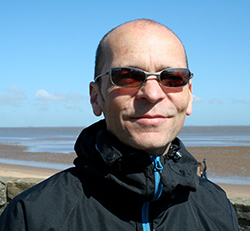Professor Simon Creer
Professor of Molecular Ecology

Affiliations
Links
- http://mefgl.bangor.ac.uk/staff/si.php
Personal website
Contact info
I am interested in using contemporary molecular tools to address diverse questions focusing on biodiversity, ecology and evolution. This is a particularly exciting time in the field of molecular ecology, since advances in DNA sequencing throughput have recently offered a paradigm shift in our ability to assess previously intractable functional and taxonomic biodiversity at an unprecedented scale, augmenting existing biodiversity fields and empowering others. Using such technologies, I am testing a range of hypotheses regarding the alpha and beta functional and taxonomic diversity of macro-, meio- and microbial communities (e.g. microbiomes) in space and time, based on genomic, community and environmental DNA (eDNA). Focal habitats have included estuarine, coastal and deep sea environments with an increasing focus now on freshwater, terrestrial, whole organisms and the aerial biosphere in order to understand the drivers of diversity in natural communities and also how diversity is linked with ecological function, trophic relationships, environmental and human health. Current additional activities include phylogenomics, population genetics, life history evolution, polyploidy, pollination genomics.
Any funded Fellowship, postgraduate or postdoctoral positions will be advertised on the group website/social media feeds, but we also welcome enquiries from candidates seeking their own funding mechanisms, to develop future research collaborations.
Email: s.creer@bangor.ac.uk
Phone: +44(0)1248 382302
Address: School of Natural Sciences, Bangor University, Deiniol Road, Bangor, Gwynedd, LL57 2UW, UK
URL: http://mefgl.bangor.ac.uk/staff/si.php
Twitter: @SiCreerProf
Contact Info
I am interested in using contemporary molecular tools to address diverse questions focusing on biodiversity, ecology and evolution. This is a particularly exciting time in the field of molecular ecology, since advances in DNA sequencing throughput have recently offered a paradigm shift in our ability to assess previously intractable functional and taxonomic biodiversity at an unprecedented scale, augmenting existing biodiversity fields and empowering others. Using such technologies, I am testing a range of hypotheses regarding the alpha and beta functional and taxonomic diversity of macro-, meio- and microbial communities (e.g. microbiomes) in space and time, based on genomic, community and environmental DNA (eDNA). Focal habitats have included estuarine, coastal and deep sea environments with an increasing focus now on freshwater, terrestrial, whole organisms and the aerial biosphere in order to understand the drivers of diversity in natural communities and also how diversity is linked with ecological function, trophic relationships, environmental and human health. Current additional activities include phylogenomics, population genetics, life history evolution, polyploidy, pollination genomics.
Any funded Fellowship, postgraduate or postdoctoral positions will be advertised on the group website/social media feeds, but we also welcome enquiries from candidates seeking their own funding mechanisms, to develop future research collaborations.
Contact Info
Email: s.creer@bangor.ac.uk
Phone: +44(0)1248 382302
Address: School of Natural Sciences, Bangor University, Deiniol Road, Bangor, Gwynedd, LL57 2UW, UK
URL: http://mefgl.bangor.ac.uk/staff/si.php
Twitter: @SiCreerProf
Research areas and keywords
Keywords
- QH301 Biology - Biodiversity, Molecular Ecology, Evolution, Environmental Genomics
Research outputs (130)
- Published
Metacommunity Theory and Metabarcoding Reveal the Environmental, Spatial and Biotic Drivers of Meiofaunal Communities in Sandy Beaches
Research output: Contribution to journal › Article › peer-review
- Published
Persistent Gaps and Errors in Reference Databases Impede Ecologically Meaningful Taxonomy Assignments in 18S rRNA Studies: A Case Study of Terrestrial and Marine Nematodes
Research output: Contribution to journal › Article › peer-review
- E-pub ahead of print
Genomics and morphometry of herbarium specimens elucidate the origin of the Cape Verde date palm (Phoenix atlantica A.Chev.) and highlight its agronomic potential
Research output: Contribution to journal › Article › peer-review
Prof. activities and awards (6)
Environmental DNA (Journal)
Activity: Publication peer-review and editorial work › Editorial activity
Genome Canada (External organisation)
Activity: Membership › Membership of committee
Ecography (Journal)
Activity: Publication peer-review and editorial work › Editorial activity
Projects (23)
KESS II Phd with National Botanic Garden of Wales- BUK2139
Project: Research
KESS II Phd with NRW- BUK2147
Project: Research

